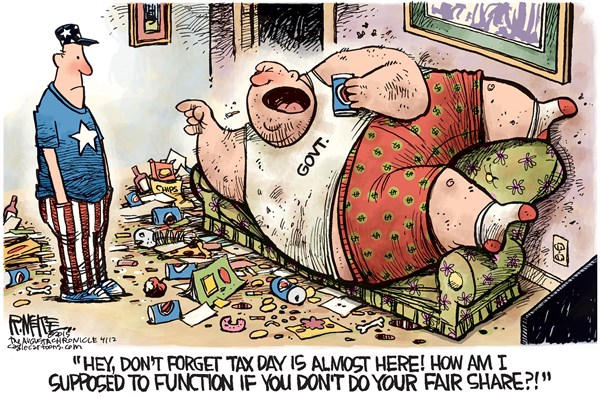
It's mid-April, and Karlyn Bowman -- the astute public opinion analyst at the American Enterprise Institute -- has noticed something significant. Tax Day "comes and goes without a ripple," she recently wrote. There's not much fuss.
Discontent with the income tax has ebbed. To buttress the point, Bowman cited intriguing survey data. A recent Gallup Poll found that only 1 percent of Americans rated taxes the nation's top problem. In a Pew poll, respondents ranked "reforming" the tax system 16th out of 24 problems. Indeed, Gallup reports that roughly half of Americans think their income-tax burden is about right.
Of course, the other half of Americans think their burden is too high. But that's down from about 70 percent in some earlier years. What explains the mood shift? Here are four explanations.
(1) Historically, the income-tax burden isn't high. In 2014, federal individual income taxes amounted to 8.1 percent of the nation's income (gross domestic product). It's been noticeably higher. From 1995 to 2000, it averaged 8.9 percent of GDP. The tax cuts of George W. Bush -- most of which have been accepted by the Obama administration -- have lightened the income-tax burden. For about 80 percent of Americans, payroll taxes for Social Security and Medicare exceed income taxes, says the Treasury Department.
(2) The remaining income-tax burden falls mainly on the rich and the upper-middle class. From 1979 to 2011, the share of income taxes paid by the wealthiest 1 percent rose from 18 percent to 35 percent, and the share paid by the richest fifth (including the top 1 percent) rose from 65 percent to 88 percent, says the Congressional Budget Office. This reflects two factors: growing income inequality (the rich pay more because they have more) and lower tax rates on the middle class. Average income-tax rates on the middle fifth of Americans have dropped from 7.4 percent in 1979 to 2.4 percent in 2011, reports CBO.
(3) Even this lightened tax burden is increasingly invisible. Most people never see the money they pay in taxes. Income taxes are not only withheld; they're overwithheld, so that many taxpayers get a refund. The Internal Revenue Service is running a mandatory saving system. (As of early April, the IRS had issued 77 million refunds worth $217 billion.) Payroll taxes are also automatically deducted.
(4) The IRS is also a welfare agency: The tax system is so complex that almost everyone benefits from some break. In 2011, 28 million poor families received $63 billion under the Earned Income Tax Credit, reports the Urban Institute's Elaine Maag. Homeowners get the mortgage interest deduction. Parents get the child tax credit. Itemizers get the charitable deduction.
The implications? For Republicans, the political punch of income-tax cuts is less powerful, because the benefits would go mainly to a relatively small segment of the electorate -- upscale taxpayers. And "tax reform" is a long shot: Too many constituencies have a stake in the existing system.
Comment by clicking here.
Previously:
• 04/09/15: The investment bust (explained)
• 04/06/15: The hopeful quest for 'full employment'
• 04/02/15: Here's something that worked
• 03/30/15: Partners in posturing
• 03/26/15: A slump to remember: The Fed must remember the disastrous outcome the last time it adopted tighter policies too soon
• 03/23/15: Whither the Fed? From mighty agency to something more tentative
• 03/19/15: Shareholder capitalism on trial
• 03/16/15: The robots are coming: Society can adjust to new technology; will it?
• 03/12/15: Increases wages --- with an asterisk
• 03/05/15: Be skeptical of 'net neutrality'
• 02/26/15: Family-friendly politics
• 02/23/15: Obama's top economists: 'Inequality isn't Middle Class' gratest challenge'
• 02/19/15: A new economic mystery: Negative interest rates
• 02/16/15: Technology doesn't pay off the way it used to
• 02/12/15: World debt is good?
• 02/09/15: The twisted priorities of a graying nation
• 02/05/15: College is no panacea
• 02/02/15: What if everything we know about the 'housing bubble' turned out to be wrong?
• 01/29/15: Austerity on trial: The world watches as 'it's Greek' changes its meaning
• 01/26/15: How other nations' troubles could slow U.S. growth
• 01/22/15: Setting the record straight on Reagan, Volcker and inflation: Part 2
• 01/19/15: Economists are baffled about Obama's recovery
• 01/14/15: 'Dynamic' deceptions: Washington's enlightened budgeting vs. cooking the books
• 01/12/15: Who stopped inflation? Volcker, Reagan and history
• 01/08/15: Europe's other unending crisis
• 01/05/15: Is the economic slog really over?
• 01/02/15: Five economic stories to watch in 2015
• 12/29/14: 'Helping' the middle class won't fix its psychological problems



 Contact The Editor
Contact The Editor
 Articles By This Author
Articles By This Author